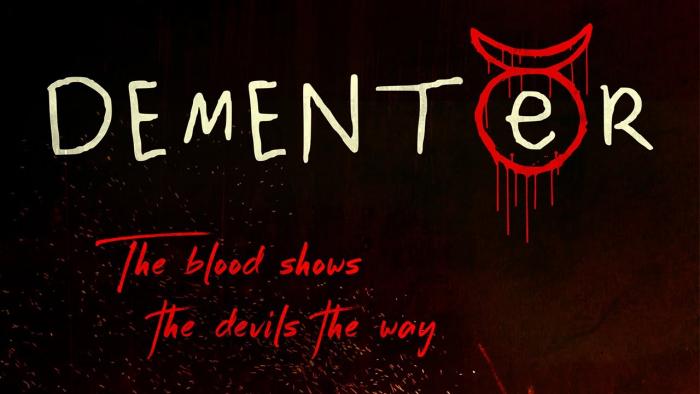Kinkle's Dementer Could Have Been So Much More
FTC Statement: Reviewers are frequently provided by the publisher/production company with a copy of the material being reviewed.The opinions published are solely those of the respective reviewers and may not reflect the opinions of CriticalBlast.com or its management.
As an Amazon Associate, we earn from qualifying purchases. (This is a legal requirement, as apparently some sites advertise for Amazon for free. Yes, that's sarcasm.)

Cinema, in all its forms, provides the childlike promise of escape, and even in its darker varieties film imparts a fantastical outlet from everyday pressures. Yet while most expressions in the horror genre are merely grisly vehicles of titillating mass distraction, filled with enticing, popcorn-munching, beer-swilling thrills and chills, blood and bare breasts, others are confrontations, less watched than survived, and from the silver screen nightmares of The Texas Chainsaw Massacre and Jacob’s Ladder to little-seen gems such as 1997’s grimy vampire-as-addict opus Habit, there is a strain of moviemaker unsatisfied with presenting a reassuring experience, preferring to let viewers interpret the work without storytelling guardrails.
It’s from this confrontational steel that the latest Smithland Films/Dark Star Pictures release Dementer is forged. From the eerie opening chimes, sickly violin-screech score and jarring, hallucinogenic visuals it clear that writer-director Chad Crawford Kinkle is aiming for more complex targets than teenaged camp counselors. In an unnamed rural Tennessee town, newcomer Katie (Katie Groshong) applies for and lands a job as a disabled support staffer at an assisted living facility, but from the onset it’s obvious something is deeply amiss: Katie hides from her boss, Brandy (Brandy Edmiston), the fact that she lives in her car and washes up in gas station restrooms, and her training days are interrupted with debilitating headaches and distressing flashbacks of a bloody, traumatic past where she’s been beaten and branded with mysterious glyphs while ominous, throaty intonations constantly remind her that “The Devils listen to the sound of the innocent.”
Katie keeps a hand-written journal filled with occult symbols and rituals, and as her visions continue, she sees portents of ill omen surrounding sweet-natured mentally-challenged resident Stephanie (Stephanie Kinkle), and is convinced something wicked this way comes to harm the woman. Determined to save Stephanie from the evil in her midst, Katie embarks on an increasingly erratic strategy to ensure her spiritual safety: she first procures a cow’s heart from the local butcher (genre vet and former Kinkle co-conspirator Larry Fessenden, who wrote, directed and starred in the aforementioned Habit and produced the similarly themed Ti West slow-burn satanic panic shocker House of the Devil in 2009), with the idea to perform a protection ritual. When it fails she moves on to claim a cat from an animal shelter that she promptly turns into a crispy kitty when her visions tell her “sacrifice will keep the devils away.” As Stephanie becomes increasing unhealthier and Katie’s journal is discovered by a snooping Brandy, the facility’s owners fire her, an act which edges the ever-desperate Katie into kidnapping in order to ensure her plan’s success.
There is virulent material on display here; Kinkle’s directing is a hallmark of unbearably escalating tension, and the straight-forward, no-frills approach gives a true-to-life, almost documentary feel to the proceedings, especially in its opening scenes. A genuinely disturbing gravity permeates the entire production, and audiences are kept as off-kilter as Katie herself, groping for a just-out-of-reach clarity that never truly arrives. Comparable sacrificial subject matter exists between Dementer and Kinkle’s earlier cinematic playground of backwoods bizarreness, 2013’s Jug Face, but where that film’s evil (an unseen monster living in a bloody pit dug deep in the forest that feeds off of the members of an isolated country community) is explicit, here it’s only implied, and frustratingly so: the repeated demonic recollections are never adequately explained, and the viewer is left in the shadows as to the origin of Katie’s dilemma and Stephanie’s peril. Was Katie, as some scenes suggest, possessed by a devil? Did she escape from a cult? Or, as the title infers, is she suffering from a demented frame of mind?
Dementer isn’t a film that sets out to reward an audience with easy answers; it’s determined to alarm through a judicious use of discomforting imagery that requires rapt attention in order to piece together the fractured mosaic plot. Yet there’s oddly nothing to show for the effort: the movie starts its bleak journey full of unsettling potential, but in the end it's an empty performance that paints with disquieting impressionism and little else. Whereas West’s House of the Devil serves a rightly-earned payoff to its slow-driving story, Dementer grinds away at the viewer’s patience at the hour mark and the attrition doesn’t let up even as the confusing finale ensues. There is a palpable sense of danger when Katie deceives the innocent, simple-minded Stephanie in order to lure her away from the group home, but there’s no follow-through on the threat; it’s only more muddled mind-altering nonsense that, while intense, provides nothing of substance to build a climax on. Kinkle may drive the viewer down sinister roads, but ultimately Dementer doesn’t arrive at any coherent destination.
I give Dementer a disappointing 2.5 (out of 5) on my Fang Scale. It could’ve been so much more.


